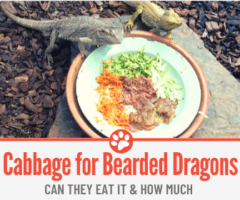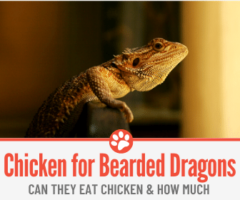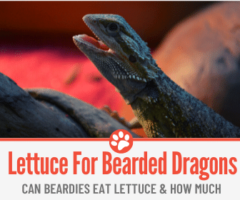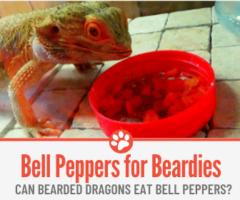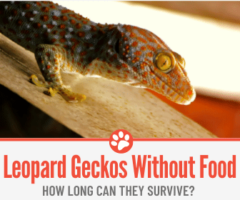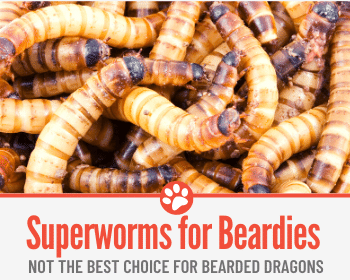 My sweet bearded dragon is my pride and joy and is a huge cuddle bug. Recently, I had family and friends admiring the little dragon as she was munching on some fruit, and everyone kept asking about what I give her to eat, especially what types of bugs I feed her.
My sweet bearded dragon is my pride and joy and is a huge cuddle bug. Recently, I had family and friends admiring the little dragon as she was munching on some fruit, and everyone kept asking about what I give her to eat, especially what types of bugs I feed her.
There was one type of bug in particular that everyone seemed highly interested in, that of the wriggly and feisty superworm.
The question kept popping up as to whether a bearded dragon could and can eat a superworm, and I really wanted to dive deeper into this seemingly simple question and answer.
Can Bearded Dragons eat Superworms?
Bearded dragons can eat superworms, although a large amount of superworms will be harmful to a bearded dragon’s overall health. In fact, superworms to beardies are like candy to humans, you can have some from time to time but only in small quantities.
Having too much of anything is neither good for humans nor for bearded dragons, but superworms especially have certain characteristics that do not make them the best feeder bug for a dragon. The amount of superworms bearded dragons should eat, when they should eat them, and how often they are allowed to eat them is a whole other set of questions that needs to be addressed separately and in detail.
That way, you will be able to make the best calculated decision in regards to whether or not you will feed your bearded dragon any superworms in the first place.
Superworms: Why You Should Choose A Different Protein Source
Superworms are like candy. Candy is tasty and delicious, and there are times when you have strong cravings for it but, have too many, and you will be facing the pain of cavities. Moreover, you can live without candy and still be healthy. Likewise, superworms are just as yummy to bearded dragons as candy is to us humans, but instead of getting cavities, dragons get constipated.
Basically, superworms are not a necessary or essential part of a bearded dragon’s healthy and nutritious diet.
In fact, bearded dragons do best with bugs that have a high protein content and a low fat content; think crickets and silkworms! Thus, one of the problems with superworms is that their high fat content can lead to weight gain and obesity in a bearded dragon. So if deciding to feed superworms to your pet, you actually have to keep a track record of how many you feed to your dragon and when.
Normally, you should only be feeding one or two superworms at a time and only once per week. More than that, and you will not be facing just unhealthy weight gain in a perfectly healthy dragon, but you will end up seeing and dealing with other complications that come with the overfeeding of superworms.
One problem commonly seen when feeding too many superworms to a bearded dragon is impaction or in other words, constipation. This is due to the hard exoskeleton of a superworm which is very difficult to digest.
Feed too many, and your beardie will have a blockage in the gut that will lead to painful bloating.
Keep in mind, too, that superworms are not calm and peaceful bugs. They can be extremely aggressive and will bite, and your best bet is to cut off the heads in order to keep your dragon safe.
Feeding superworms to your dragon is a decision that only you yourself can make. Weighing the pros and cons, though, is something not to be taken lightly. There are many people who are willing to feed superworms to their dragon, but, even then, the superworms should be looked at as an occasional treat as opposed to a staple feeder bug.
Depending on who you ask, you will get all types of different answers regarding superworms, but facts are facts and making a well-informed decision is the best thing that you can do for your bearded dragon.
Are Superworms Good For Bearded Dragons?
Superworms are definitely not the best thing out there to complement a bearded dragon’s healthy diet or general well-being. They are high in fat, have a hard exoskeleton, and have a tendency to bite. They may be a fun snack from time to time if your dragon is a huge fan, but if we are basing “good” around nutritional value and health benefits, then, no, this should not be your top choice in feeding your beardie.
Are Superworms Bad For Bearded Dragons?
Superworms can be bad for bearded dragons if not handled properly. First off, it is important to note that superworms are known to bite, so clipping off their heads before they can take a stab at your dragon is something to remember to do. Superworms can also cause obesity in your dragon and, in turn, cause gut health problems because they have a very high fat content, whereas bearded dragons thrive on a higher protein diet.
Another way in which superworms can negatively affect your dragon is due to their exoskeletons.
Exoskeletons are extremely difficult to digest for a bearded dragon and may cause impaction, or constipation, if given too frequently to your pet. All in all, superworms are not exactly bad for your dragon, but they are not necessarily good either.
How Many Superworms Should I Feed To A Bearded Dragon?
If you do feed your beardie superworms, you should only feed only about 1-2 superworms once a week. Otherwise, your bearded dragon could become constipated and have problems with digestion.
Do Superworms Cause Impaction in Bearded Dragons?
Yes, superworms can most definitely cause impaction, otherwise known as constipation, in a bearded dragon. Because of the fact that superworms have hard exoskeletons, they are very difficult to digest and may build up in your dragon’s intestines and cause painful bloating. This is why it is very important that if you do decide to use superworms as a part of your dragon’s diet, you need to be very careful of the quantity and frequency of the superworms being fed to your pet.
Best Bugs For Bearded Dragons
The best types of bugs for your bearded dragons are those that are high in protein but low in fat! Bearded dragons can gain weight and have obesity problems and so avoiding giving too many bugs with high fat contents is a good rule of thumb to follow.
In fact, silkworms are the most nutritious type of worm you can find that is both low in fat and high in protein, but also one that contains a high nutritional value which are all important aspects to consider in regards to your pet’s health needs. The downfall to these worms is that silkworms can be quite hard to keep alive and may get pretty expensive.
On the other hand, crickets are the cheapest bug to get a hold of at reptile stores, and they are easy to store. Admittedly, they may die quickly if not taken care of properly, but they have a good calcium and protein ratio and are known to be a healthy food for bearded dragons without any negative side effects.
Related Questions
Can you give superworms to juvenile bearded dragons?
Superworms should never be given to baby dragons, and giving them to juveniles bearded dragons is not the best idea either. You would have to be careful about the size of the superworms, and it would be a wiser choice to refrain from using superworms at all until your dragon has become fully grown.
That is, if you do end up wanting to feed the superworms to your dragon in the first place.
What bugs should not be fed to bearded dragons?
In general, you should never feed your bearded dragon any insects or bugs of any type that you have caught yourself. You do not know what types of diseases or viruses a wild buy may be carrying, and you may potentially expose your dragon to a dangerous illness or problem.
Stick to insects and bugs sold from reliable pet stores. That being said, do not feed your dragon any glowing bugs, bugs that excrete smells, or any bugs that bite, such as centipedes. Butterflies, bees, and houseflies are also to be avoided and never fed to your pet.


